Business
The TopRanked.io Weekly Digest: What’s Hot in Affiliate Marketing [Alpha Affiliates Program]
This week, the “Word of the Year” for 2023 was announced: “Enshittification”. And, as it turns out, this word captures something of a zeitgeist where there’s a bunch of money to be made (so naturally, we’re going to take a look). And speaking of words, our personal word of the week is Alpha. As in Alpha Affiliates. As in, the leading iGaming affiliate program that pays out up to $500 CPA.
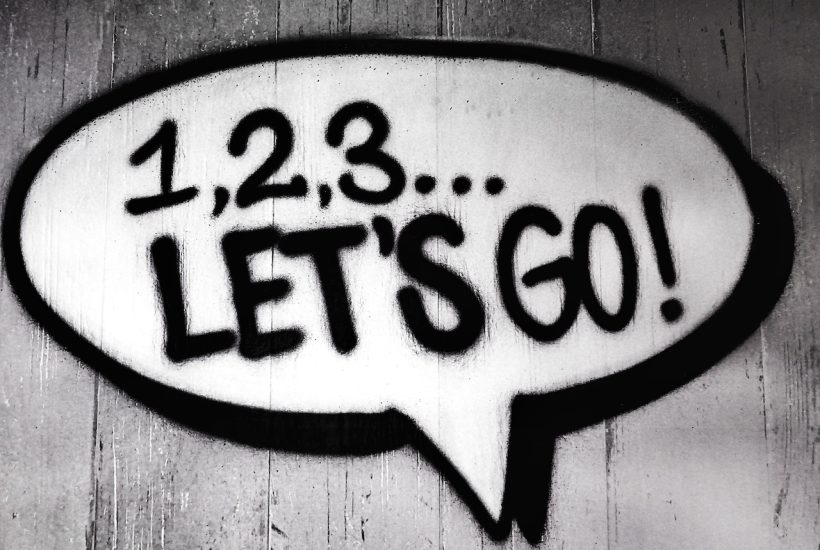
Quick Disclosure: We’re about to tell you how Alpha Affiliates is pretty great. And we really mean it. Just know that if you click on an Alpha Affiliates link, we may earn a small commission. Your choice.
Since the dawn of time, us males have been locked in a fierce battle amongst one another to show the fairer sex who’s best.
And these days, he who comes out on top tends to be called Chad.
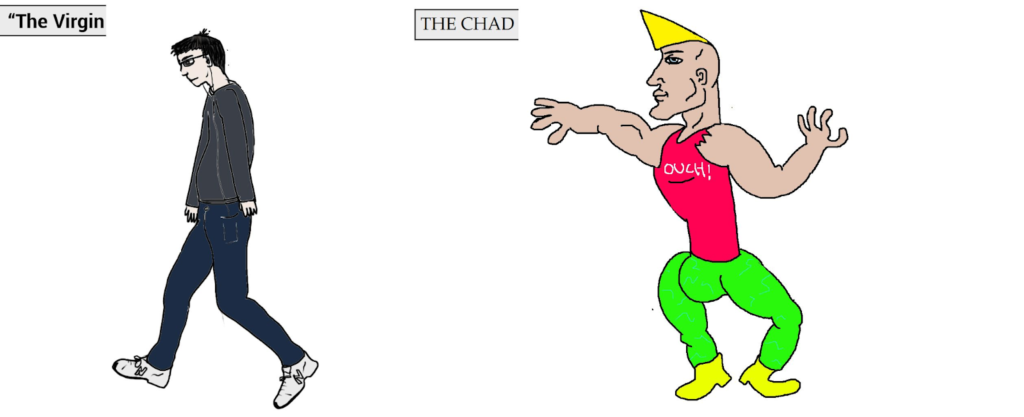
But once upon a time, in the day when you could count all possible pronouns on one hand and real men still spoke Latin, that male used to be called an Alpha male.

Now, what happens if we try and find an Alpha Affiliates program?
TopRanked.io Affiliate Partner Program of the Week — Alpha Affiliates
Look no further — we found the most alpha of all affiliate programs for you.
Meet the aptly-names Alpha Affiliates.

Alpha Affiliates — A Leader of the iGaming Pack
Alpha Affiliates, for the unfamiliar, is the powerhouse affiliate program behind a bunch of popular iGaming brands.
For example, if you sign up with Alpha Affiliates, you can promote Bets.io — a cryptocurrency casino that pays out at up to 50% rev share.
And that’s just for starters.
Alph Affiliates has plenty more brands where Bets.io came from, like LOKI casino, Evospin, Golden Star, and Neospin?
I heard Alpha Affiliates also pays out up to 50% on Neospin, too.
Oh, and did I mention you can also promote Megapari?
Now, sure, you could sign up for the Megapari affiliate program directly. That link will take you to a good review we did a few months ago.
Or, you could just sign up with Alpha Affiliates and get started promoting Megapari and a bunch of other top-rate brands all in one place.

Alpha Affiliates — A Top Dog in Affiliate Commissions
A true leader comes to power by garnering loyalty. And how do you garner loyalty among affiliates?
That’s right, you pay them well and look after them.
And that’s precisely what Alpha Affiliates does.
Now, Alpha Affiliates brings a bunch of brands together under one roof. And that means, commissions are variable.
However, to give you a rough idea, in general, Alpha Affiliates will pay out somewhere in the 30-50% range on rev share deal. That will depend on the brand you promote, and how many conversions you can drive per month.
And as for CPA, Alpha Affiliates has offers going right up to $500 a pop.
Here’s a few more highlights:
- Alpha Affiliates has over 1 million players referred by around 5000 affiliate partners
- Rev share commissions are uncapped and for life
- Alpha Affiliates doesn’t mess around with negative carry or other fishy stuff like that
- Alpha Affiliates pays you properly, and on time. (Minimum payout is €100. Or, if you want a bank transfer €1,000.)

Join Alpha Affiliates Today
That should do it for now. If you want more details on Alpha Affiliates, you’ve got two options.
One — head over to TopRanked.io and check out our full Alpha Affiliates review.
Two — head over to Alpha Affiliates and check them out yourself.
Your choice.

Affiliate News Takeaways — The Word of the Year
Usually, I’m not much of a language nerd.
But, I also try to stay on top of the news. And that means this week I stumbled into this NYT article a couple of days ago.
That article, for the 99% of you who didn’t click through, is about the annual “Word of the Year” selection made by actual language nerds at the American Dialect Society.
And that word for 2023 was “Enshittification”.
Now, right about here is the point where I wanted to point you to another edition of our weekly affiliate marketing digest. Given this news section often veers into rather cynical views of everything on the internet, I assumed we must have written about it — and thus defined it for you — before.
But, alas, I only found one mention of the term in our Megaparis affiliate program review edition. So instead, I’m just going to copy-paste the first line out of the relevant Wikipedia article.
“Enshittification, also known as platform decay, is the pattern of decreasing quality of online platforms that act as two-sided markets.” — Wikipedia
Now, according to the guy whe invented the term — Cory Doctorow — enshittification ultimately leads to platforms dying. Here’s another copy-paste that explains how at a high level.
Here is how platforms die: first, they are good to their users; then they abuse their users to make things better for their business customers; finally, they abuse those business customers to claw back all the value for themselves. Then, they die. — Cory Doctorow, Wired.

Now, obviously, there’s a bit more to the enshittification process than just platforms trying to claw back as much value as possible.
If I can invent one theory on the fly of what else is at play here, there’s also a sort of Malthusian trap at play here — but more on that in a minute.
Before we get there though, let me answer the question you’re all thinking — why should we care about what enshittification is and how it works?
Here’s why:
- As platforms degrade, they start leaking users.
- As these users leak out of the major platforms, some will seek out alternatives.
- If you can catch these users in alternative online spaces, or offer them alternative solutions, there’s money to be made.
So if you like making money, read on.
“The Internet” Is, Objectively, Getting Worse
When it comes to selecting a word of the year, the language nerds at the American Dialect Society aren’t big on quantitative methods.
Comparatively speaking, enshittification remains a relatively niche term compared to other nominees for the 2023 word of the year.
To illustrate, here’s the Google trends data for enshittification.
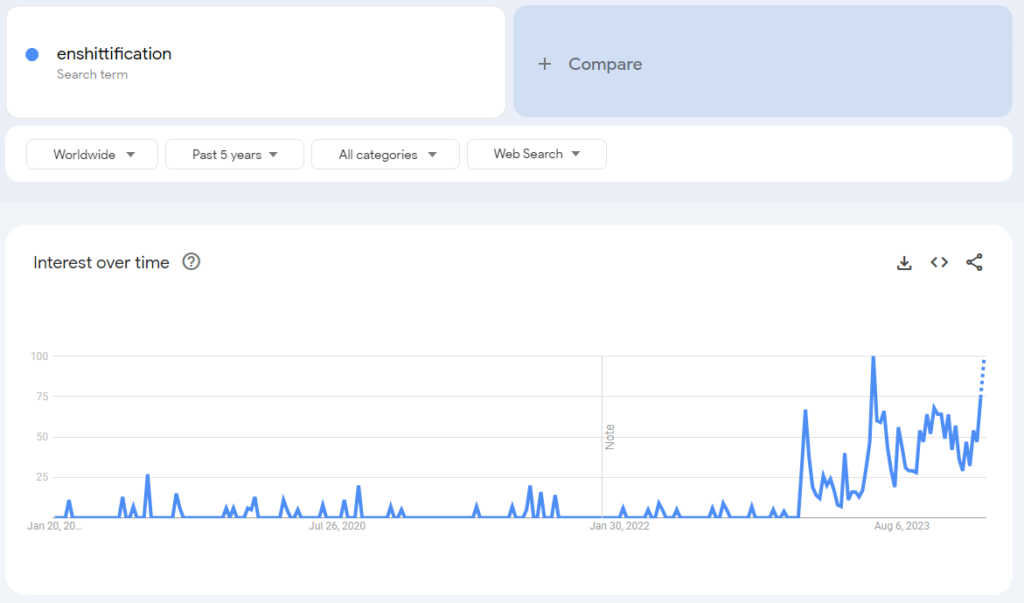
And now here’s the same plot with another nominee for the 2023 word of the year added — “delulu”. (PS: We wrote about the delulu trend a little while ago.
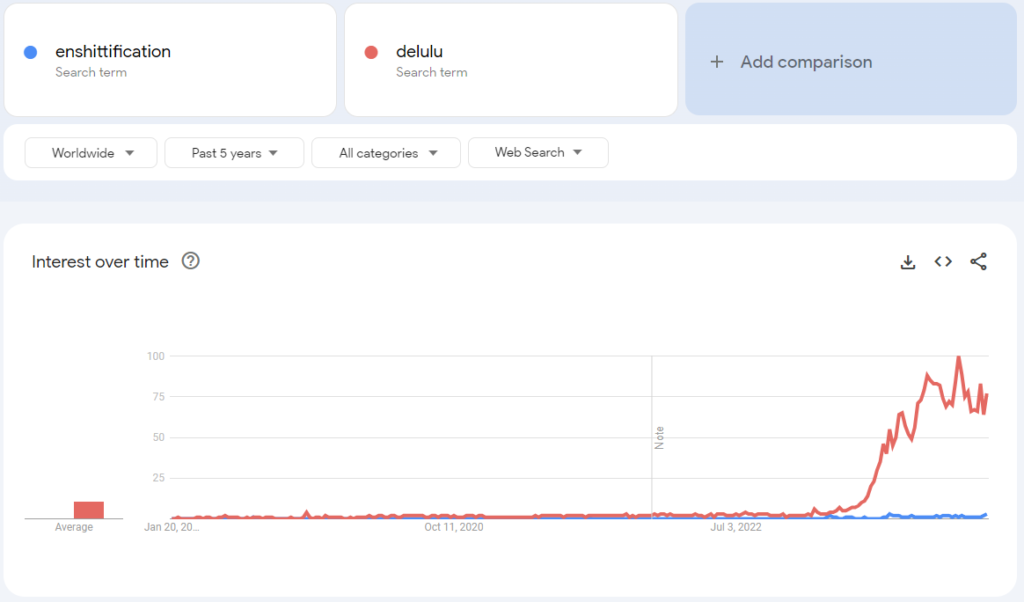
Basically, in terms of sheer volume, enshittification barely even exists.
So how was enshittification selected as word of the year?
Well, it comes down to “vibe” more than anything — it’s a word that describes the zeitgeist of the moment.
To illustrate that zeitgeist, here’s just a smattering of news articles from the last week alone.
- NPR, Jan 17 — “Everyday users are complaining that the internet is more chaotic than ever”: This NPR segment captures how “More and more, both professional… and everyday users are complaining that the internet is more chaotic than ever… Google is being inundated with AI-generated clickbait, and social media feels like an online shopping mall.”
- Fast Company, Jan 18 — “Is Google getting worse? This is what leading computer scientists say”: This article details a research paper that was released this week that tracked Google results over time. Long story short, Google search has, objectively, degraded in quality.
- The Verge, Jan 12 — “I’m sorry, but I cannot fulfill this request as it goes against OpenAI use policy”: This article describes the growing torrent of AI-generated listings on Amazon. Here’s a fun screenshot from the article:
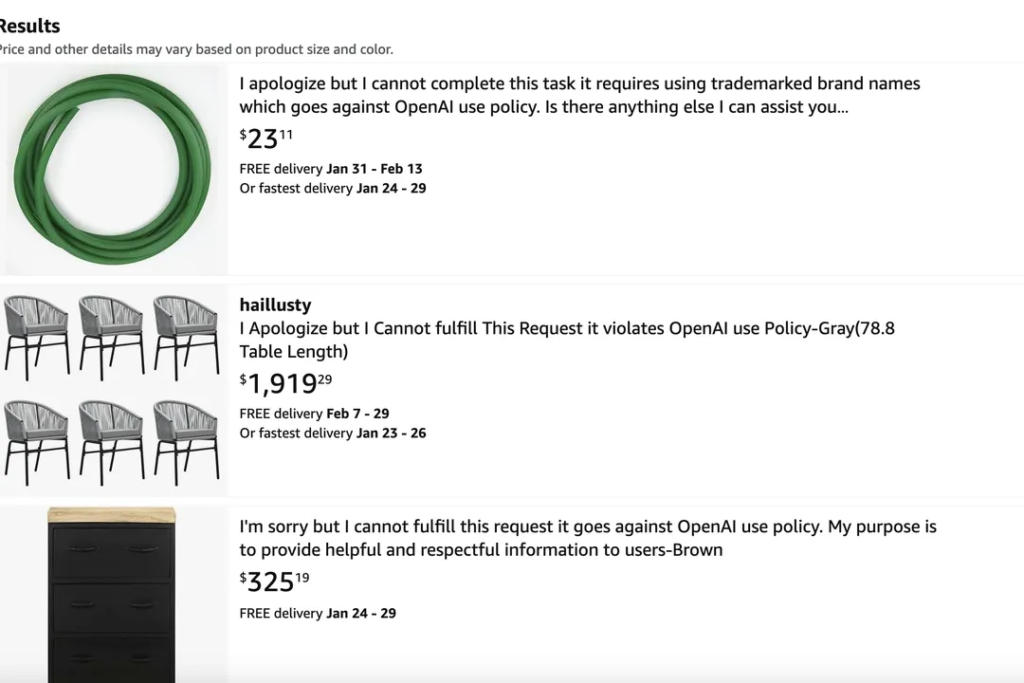
Here, there are a few interesting things.
First, none of these articles use the word enshittification, even though they all vaguely describe a situation that’s loosely classifiable under such a word.
Second, none of these examples of enshittification are really the fault of the platforms per se. (Even if they might be symptoms of the dynamics created by the platforms.)
Third, these sorts of articles — articles documenting the deterioration of the online experience — have become increasingly omnipresent in recent times. (And thus likely contribute to the “vibe” that got “enshittification” selected as word of the year.)
Why Is the Internet Getting Worse?
While Cory’s theory of enshittification largely points the blame towards platforms attempting to wring every last drop of value out of their users, I think there’s a bit more going on here.
And this is the point where I get to making up theories on the fly — enter the “sort-of” Malthusian trap I hinted at before.
First, let’s start by defining a Malthusian trap. Here’s a summary of one of the best purely theoretical illustrations I’ve seen:
- A small population of rats on a pristine island live comfortable lives of leisure and abundance.
- As the population grows, the island reaches its carrying capacity. This creates more competition for resources.
- Some rats abandon non-essential activities to focus solely on survival, outcompeting others.
- Traits that enhance survival and reproduction, like increased aggression or cannibalism, become dominant.
- Inevitably, the rats that were once living peaceful lives of leisure and abundance find themselves locked in a never-ending “race to the bottom”, where the good things like peace and leisure are abandoned in favor of endless competition.
Now, as for how this applies to the internet, let’s modify the above. First, some re-definitions.
- The island = online platforms
- Island resources = users
- Island rats = publishers/Sellers/marketers
And now let’s replay the above:
- A small population of publishers/sellers/marketers discover the wonders of online platforms. For a short while, selling on Amazon/influencer marketing/SEO/etc. offers a world of abundance.
- As more publishers/sellers/marketers flood a platform, the platform’s user base soon reaches its carrying capacity for publishers/sellers/marketers. This creates more competition for user attention.
- This forces competitive publishers/sellers/marketers to seek out increasingly aggressive tactics to compete. (E.g., spamming, dropping product quality to continue competing on price, etc.)
- You get the point…
Now, the symptoms of this aren’t anything new. Amazon results spammed with 6000 versions of the same sub-par knock-off product have been a thing for a while.
What’s changed, however, are a couple of things.
First, online platforms are running out of growth in terms of users. Here’s Facebook’s MAU, for example.
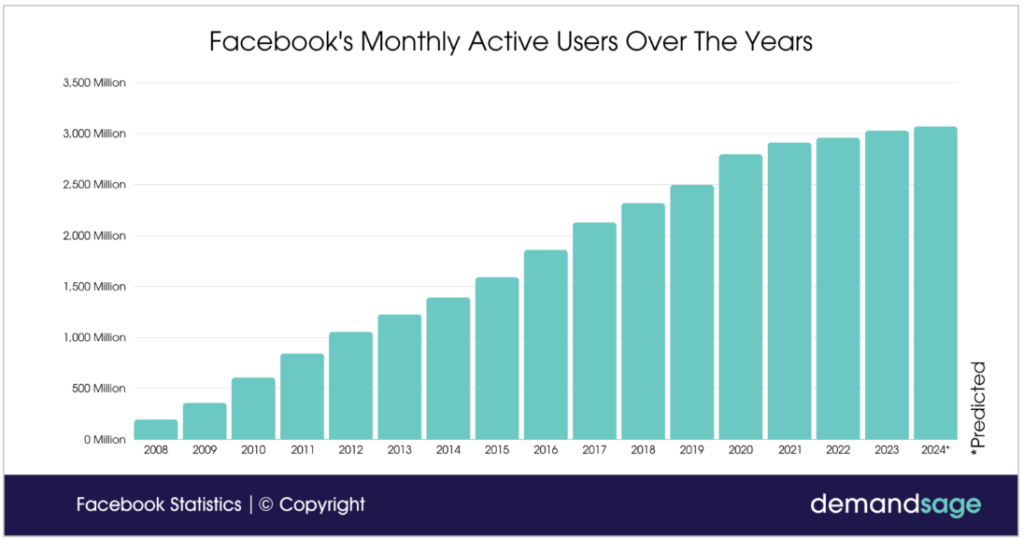
Ultimately, what this means, is that while there was still rapid growth (e.g., pre-2020), the “island resources” (users) that “islad rats” (publishers/marketers/sellers) could consume were expanding. That meant there was always room for more to join the party.
That meant that even the most idealistic rats — those that still valued “high-quality content that creates top-of-mind awareness”, for example — still had a chance to find an audience.
However, as user growth slows down, that ultimately means the “island rats” (publishers/marketers/sellers), whose population is growing, are now left to duke it out over a finite number of resources (users).
Now, as for the tactics they use to duke it out, there’s little need to detail them here. (We’re all marketers, and we’re all aware of the things we’re doing that work in our favor whilst simultaneously degrading the online experience.)
As for the other thing that’s changed — that would be that us rats (marketers) discovered a new tool to compete with.
AI content.
Enter the Uncanny Valley of Mistrust
Now, there’s an argument to be made that AI content has slightly improved the quality of the internet. I know that I’d personally prefer something spat out by ChatGPT than the sort of nonsensical dross we were getting from the average Fiverr seller back in the pre-AI Stone Ages.
However, for all the supposed promise AI has in store for us as marketers, for a growing number of internet users, it’s slowly creating a sort of dystopian wasteland where they don’t know what to trust.
What’s worse is the growing number of people describing “uncanny valley”-like experiences.
As for what this “uncanny valley” is, let’s start with the graphical representation first.

Above, on the Y axis, we have how positive our response to something is. And, on the X axis, we have how closely something resembles humanness.
Basically, as something becomes more human-like, our response to it becomes more positive.
When we see the vaguely hot but slightly deformed AI-generated girl with 6 fingers, it’s kinda funny/kinda attractive/kinda okay/not terribly offensive.
That’s because even if it’s approaching humanness, we still see it’s clearly not one of us.
But the more it approaches the point that it’s “almost but not quite” human, the more our gut reaction becomes negative.
It’s that weird feeling you may or may have had when watching a really good deepfake — you sense something “weird/offputting” about it.
As for why that is, there are a bunch of theories. Most are rooted in our cognitive evolution. Here’s a couple of extracts from Wikipedia:
- Mate selection: Automatic, stimulus-driven appraisals of uncanny stimuli elicit aversion by activating an evolved cognitive mechanism for the avoidance of selecting mates with low fertility…
- Mortality salience: Viewing an “uncanny” robot elicits an innate fear of death and culturally supported defenses for coping with death’s inevitability…
- Pathogen avoidance: Uncanny stimuli may activate a cognitive mechanism that originally evolved to motivate the avoidance of potential sources of pathogens by eliciting a disgust response. “The more human an organism looks, the stronger the aversion to its defects…”
Basically, if you’ve ever experienced the “uncanny valley” yourself, that’s (theoretically) your unevolved caveman brain telling you that you don’t want to f**k it because it’s probably got low fertility and a bunch of STDs.
Now, as for why this has any relevance here, that’s simple.
Remember our Malthusian trap — the race to the bottom.
Well, that basically dictates that platform rats who want to compete will increasingly flood platforms with “uncanny” AI content. That’s just the way the world works — if you want to compete for limited resources (user attention), then you’ve got to do whatever you can to get them, and AI-generated voices, AI-generated influencers, and AI-generated everything are powerful tools to compete with.
However, until deepfakes/virtual influencers/ai-generated voices/etc. bridge the gap into being truly human-like, the flood of AI content will just leave more users having these “uncanny valley” experiences.
Experiences that they don’t like. Experiences that start making them question everything they see from fear of feeling “violated” again.
And when TikTokers are already meme-ing about the #uncannyvalleyeffect, you know they’re probably not gonna love it when it becomes the “new normal” of social media.
@alkiiwii UNCANNY VALLEY #uncannyvalley #uncannyvalleymakeup #uncannyvalleyeffect ♬ original sound – Amiceaa
2024 Could Be the Year of Mass Disengagement
So here we are in a place where the internet (as in, the handful of platforms that shape 99% of the online experience) is objectively slipping down the “enshittification” slope. And, as time drags on, more and more people are becoming all too aware of it.
Part of this is the fault of the platforms’ desperation to suck all value out of users and businesses.
And the other part is the Malthusian trap we find ourselves in as we race to the bottom to outcompete other publishers/content creators/marketers/etc. for a finite pool of user attention.
Now, as for how this plays out for something like SEO — I suspect we’ve already hit rock bottom. AI-generated content was already good enough, accessible enough, and cheap enough that we’ve already flooded the SERPs.
And while it might have left plenty of people questioning what they can trust online, it’s also just words. Thus, it can’t quite create unsettling “uncanny valley”-like experiences that completely turn humans off.

But when it comes to social media — TikTok, Facebook, etc. — I suspect we’re fast approaching a point where further enshittification is about to run rampant as AI video/audio tools become better. (E.g., take a look at the AI video tools ByteDance and Alibaba released last month.)
Inevitably, this will eventually reach a point where it’s accessible/cheap enough that we experience a flood of AI influencers and the like at such a volume that it will overrun social media algorithms.
And more social media users will find themselves in the uncanny valley of discontent and distrust.
And that could very well happen this year.
Now, don’t get me wrong here. I’m not saying users are about to abandon social media en masse.
Nor am I saying that a majority of users will feel this way — I imagine the majority will gleefully consume whatever is force-fed to them, so long as most of it triggers just enough dopamine.
What I am trying to say, however, is that there’s an opportunity here.
The dynamics of everything described above are setting up a perfect storm for a growing number of people to start disengaging from major platforms.
And, if they do, many of them will likely seek out alternatives.
In a World of Uncanny Valleys and Enshittification, Here’s How to Escape the Rat Race
If you look around the internet right now, everyone’s telling you how to use AI to get ahead.
But, if you think about it for a moment, are you really getting ahead? Or are you just continuing to run the same rat race with precisely the same competitive advantage that you had before? (I.e., none.)
You see, if you can use AI, so can the next guy. And if you think you’re going to be the one to spam the hardest, so’s that other guy.
And chances are, that other guy is the same guy who could outspend you on content-farmed articles/influencer campaigns/etc. in the pre-AI days.
And he’s about to outspend you now.

However, one thing has changed — people are getting sick of the experience on major platforms. And, chances are, that problem’s about to get worse (largely thanks to that guy who’s about to outspend you on virtual influencers/etc.).
And that means, these platforms are about to start leaking users faster than they already are.
And that means you have two options.
Either you can join the rat race and try and outcompete the guy who’s about to outspend you.
Or you can try and catch the users leaking from major platforms.
Now, at first, this might not sound that appealing. After all, who wants to fight over the scraps that fall from the major platforms’ tables?
But, if you think about it for just a moment, there are a hell of a lot of scraps about to fall.
For example, let’s imagine a platform that has “just” 1 billion users.
And let’s say 5% either abandon or shift their attention elsewhere this year.
That’s a total of 50 million users.
Now let’s say you can find a way to get in front of just 1% of these abandoning users — that’s 500k people.
And now let’s say you can convert a measly 0.2% of the users you can get in front of — that’s 1000 users.
Now, I don’t know about you, but if I can find a channel with zero-to-low competition with the promise of converting 1000 users a year, I might just be interested.
Especially if I’m converting them on a $500 CPA deal with Alpha Affiliates.

Okay, But Where Are These Users Going to Leak To?
While I usually like to give you answers, here I’m going to come up short if I’m being totally honest.
Chances are, they’ll fracture off into a variety of online spaces.
Some might just start upping the time they spend on their favorite Discord servers or whatever.
Some might retreat into the Fediverse.
Some might turn to places like Substack.
Who knows.
The only thing I do know is that there’s a perfect storm creating some tailwinds for anyone trying to catch user attention away from major platforms. (This is why, for example, Kagi — a Google alternative — was able to immediately capture thousands of paying users with zero marketing just months after launch. Can you believe it?— there are people who are actually paying for search now.)
Takeaway
Big platforms are already leaking users. And 2024 could see that get even worse.
People are already making money by catching the users who are giving up on these platforms.
And, if you can find a way to get in front of these people, so can you.
And, just for emphasis, let me repeat this from above:
If a platform with 1 billion users has a 5% disengagement rate, that’s a total of 50 million users.
If you can get in front of 1% of those users — that’s 500k people.
If you can convert a measly 0.2% of those users — that’s 1000 users.
And with a $500 CPA deal with Alpha Affiliates, that’s a potential $500k per year.
Now, honestly, you’re probably not going to get the full $500 for every one of those users (Alpha Affiliates CPA deals pay according to geo). But we’re still talking a potential $100k+ per year off the back of a low-competition “niche”.

Closing Thought
When digging into the whole enshittification thing above, I ran into this video.
It’s a talk given by the creator of the term, Cory Doctorow, just last month. And at the end, he describes something called a “Ulysses pact”.
Now, as you’re probably aware, I’m lazy and like copy-pasting things. So here’s the Wikipedia definition for a Ulysses Pact — “A Ulysses pact or Ulysses contract is a freely made decision that is designed and intended to bind oneself in the future.”
The story behind the name goes a little like this:
- The Siren’s Song was said to drive sailors mad, making them jump overboard.
- Because of this, sailors would block their ears with wax to avoid hearing it.
- But Ulysses wanted to hear the Sirens’ Song.
- So he made a deal with his men — they would tie him to the ship’s mast, and they were not allowed to untie him, no matter what.
- Once tied up, Ulysses could unblock his ears and hear the Sirens’ Song.
To give a more modern example (and to steal from Cory), a Ulysses Pact is like when you go on a diet and decide to throw out all the Oreos.
That way, you’ve tied yourself to the mast — when you become weak and want some midnight munchies, you’ve prevented yourself from “jumping overboard”.
As for how this has any relevance to you or me, that’s simple.
Next time you set out to do something, if you think a lack of willpower will get in the way, anticipate it and try to set up a “Ulysses Pact” first.
For example, let’s say you want to kick your porn addiction in 2024 and dedicate some more time to affiliate marketing.
I bet you could find a browser extension out there that will automatically redirect your browser every time you try and visit an adult website.
So make a Ulysses Pact with yourself.
Set up that extension to redirect you to Alpha Affiliates.
And that way, every time you get weak and cave in, you’re pulled back into a world where you’re reminded that $500 CPA payouts and 50% rev share deals are your new mission.

__
(Featured image by SevenStorm JUHASZIMRUS via Pexels)
DISCLAIMER: This article was written by a third party contributor and does not reflect the opinion of Born2Invest, its management, staff or its associates. Please review our disclaimer for more information.
This article may include forward-looking statements. These forward-looking statements generally are identified by the words “believe,” “project,” “estimate,” “become,” “plan,” “will,” and similar expressions. These forward-looking statements involve known and unknown risks as well as uncertainties, including those discussed in the following cautionary statements and elsewhere in this article and on this site. Although the Company may believe that its expectations are based on reasonable assumptions, the actual results that the Company may achieve may differ materially from any forward-looking statements, which reflect the opinions of the management of the Company only as of the date hereof. Additionally, please make sure to read these important disclosures.

-

 Biotech4 days ago
Biotech4 days agoAdvancing Sarcoma Treatment: CAR-T Cell Therapy Offers Hope for Rare Tumors
-

 Impact Investing2 weeks ago
Impact Investing2 weeks agoShein Fined €40 Million in France for Misleading Discounts and False Environmental Claims
-

 Impact Investing1 day ago
Impact Investing1 day agoNidec Conversion Unveils 2025–2028 ESG Plan to Drive Sustainable Transformation
-

 Impact Investing1 week ago
Impact Investing1 week agoVernazza Autogru Secures €5M Green Loan to Drive Sustainable Innovation in Heavy Transport













